 All Our Tours
All Our Tours
Written by: Vicky Nguyen
Updated date:03/05/2025
Hello, I’m Vicky! As a passionate travel enthusiast and tour planner at Asia Viva Travel, I’ve gathered extensive experience traveling across Vietnam and other captivating destinations in Southeast Asia. Now, I’m thrilled to share these adventures with you through my blog. From my journeys, I’ve gained a deep understanding of the unique cultures, hidden gems, and unforgettable experiences that this region has to offer. My goal is to bring you authentic and practical insights to help you design your own remarkable adventures. Join me, and let’s discover these extraordinary places together!
Contents
Situated along the tranquil Mekong River, nestled in the southern region of Laos, Pakse is an emerging destination that captivates travelers with its serene charm. This picturesque town offers a perfect blend of natural beauty, rich culture, and a peaceful way of life. As Pakse gains popularity among visitors, it remains an ideal retreat for those seeking a truly relaxing getaway amidst stunning landscapes and authentic Lao experiences.
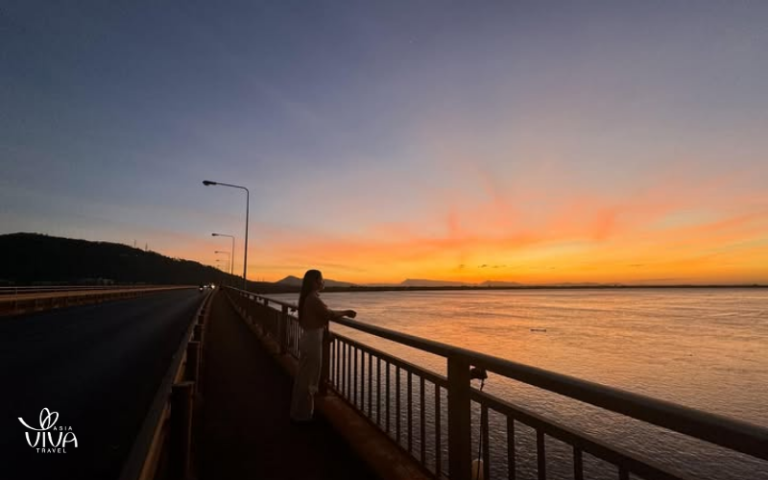
Pakse at sunset – where serenity meets the Mekong
Pakse is a vibrant city located in the Champasak province of southern Laos, near the border with Thailand. It is strategically positioned at the confluence of the Mekong and Sedone Rivers, benefiting from fertile alluvial soil that supports both agriculture and trade. The city is also home to the Japan-Laos Friendship Bridge, a key crossing that strengthens its connection with Thailand, making Pakse not only an important commercial hub but also a growing tourist destination.
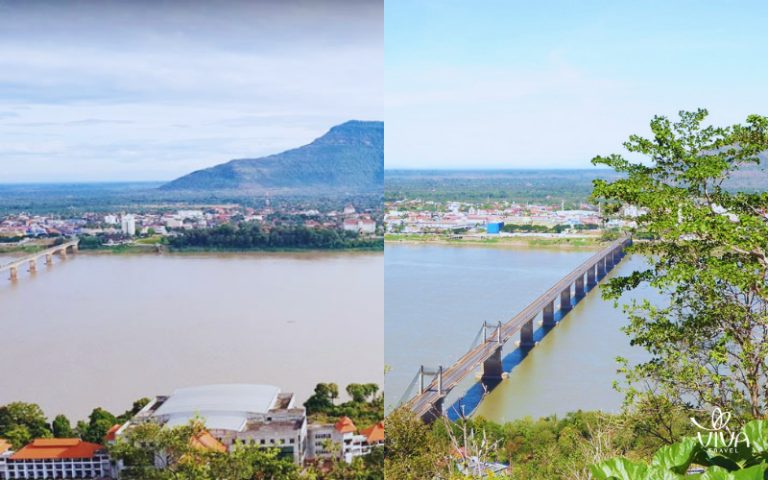
Japan-Laos Friendship Bridge – a symbol of connection
Though smaller and quieter than Vientiane, Pakse is Laos’ second most populous city—a charming blend of economic significance and natural splendor. Framed by the majestic Bolaven Plateau and the serene 4,000 Islands (Si Phan Don), Pakse is a gateway to thundering waterfalls, lush coffee plantations, and the tranquil flow of the Mekong.
With its peaceful atmosphere, rich cultural heritage, and well-priced yet high-quality services, Pakse offers the perfect mix of adventure and relaxation. Whether you’re stopping by on a longer journey or seeking a memorable day trip, this hidden gem welcomes travelers with warmth, flavor, and value.
Pakse enjoys a favorable geographical location, and with Laos’ generally mild climate, visitors can explore this destination at any time of the year. However, for the best experience, especially for those who wish to admire the scenery and engage in outdoor activities, the dry season is the most recommended time to visit.
After choosing the best time, to be able to arrange a reasonable schedule, visitors can refer to the Pakse tour schedule combined with some tours in Laos at Asia Viva Travel.
>> Maybe you are interested: https://asiavivatravel.com/en/exploration-of-twin-capitals-in-5-days
Located near a mountainous region, Pakse is home to numerous breathtaking waterfalls, making it a must-visit destination for nature lovers and adventure seekers. Among the top highlights when exploring what to do in Pakse, Laos is a visit to Tad Yuang Waterfall, which stands approximately 40 meters high, surrounded by a lush forest. The waterfall has a moderate flow, creating a picturesque and serene atmosphere, ideal for outdoor activities such as swimming, camping, and photography.
Visitors can also embark on a trekking journey around Tad Yuang through the surrounding forest, but it’s important to have a local guide accompany you. The trails can be challenging, and having an experienced guide ensures a safer and more enjoyable exploration, helping you navigate tricky terrain while discovering hidden gems along the way.
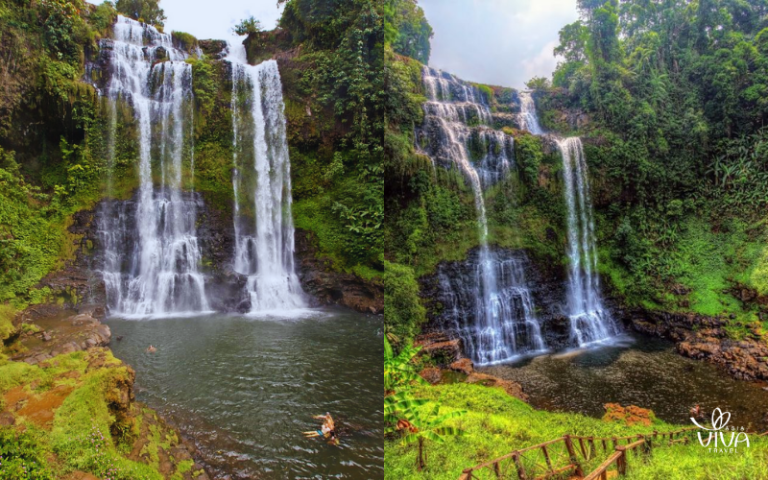
Tad Yuang Waterfall – nature’s peaceful roar
One of the must-visit destinations in Pakse is the Bolaven Plateau, which sits at an elevation of approximately 1,200 meters above sea level. This stunning highland is not only known for its lush forests and breathtaking waterfalls like Tad Fane and Tad Yuang, but it also offers visitors a unique opportunity to engage in local coffee production experiences.
The Bolaven Plateau is renowned for its high-quality coffee, with its rich volcanic soil and cool climate creating the perfect conditions for cultivating some of the finest beans in Laos. Travelers can visit local coffee farms, learn about the harvesting and roasting process, and even enjoy freshly brewed coffee straight from the source—an unforgettable experience for coffee enthusiasts.
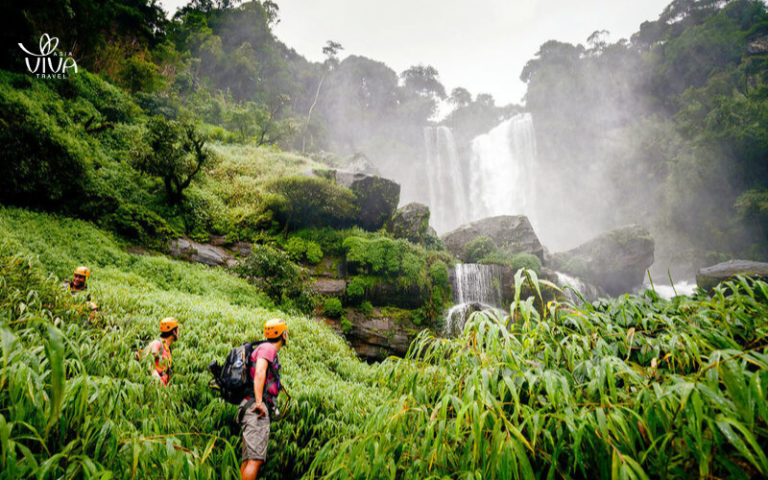
Bolaven Plateau – where coffee tells its story
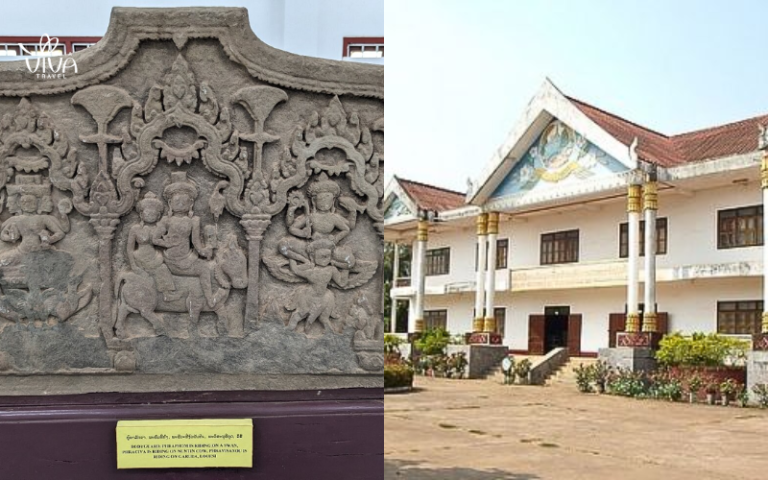
Echoes of Champasak – a museum of time
Chomphet Stone Sculpture Village and Temple Complex is a peaceful spiritual site located just a short tuk-tuk ride from Pakse, Laos. While it remains tranquil on weekdays, it can get busy during weekends and religious holidays as locals gather to worship and offer prayers.
The highlight of the complex is a towering Buddha statue that draws visitors from near and far. As you explore, you’ll often see monks, nuns, and women preparing beautiful offerings for the temple.
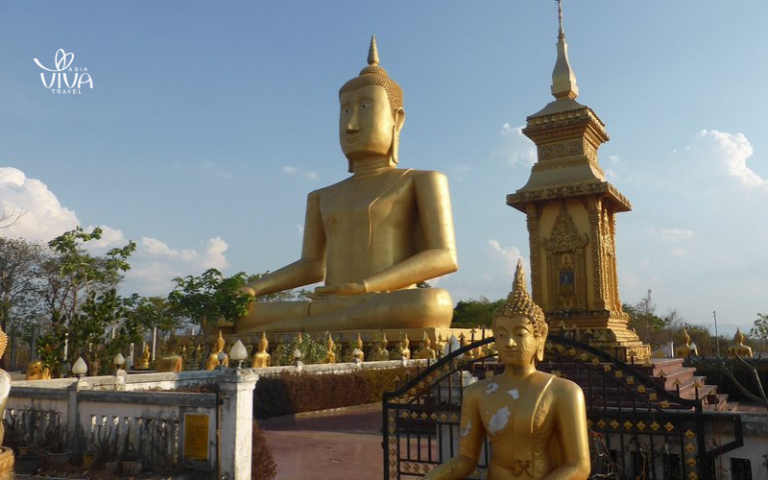
Sacred hands shaping timeless faith
Just behind the temple grounds lies the Chomphet Stone Sculpture Village, where skilled artisans transform plain river stones into stunning Buddha statues. There’s also a fascinating workshop dedicated to cement Buddha casting – watching how each piece is carefully molded and assembled is a unique experience. After visiting the temple, tourists can take a stroll down the road to observe more sculptors at work, tirelessly creating new spiritual masterpieces.
In the ancient Phou Salao temple, visitors will certainly be amazed by the giant golden Buddha statue. Standing tall in a serene posture, this majestic statue exudes peace and strength, with its golden surface gleaming under the sunlight, making it visible from across the city. It’s not only a spiritual symbol but also a striking landmark that embodies the tranquility and devotion of the Laos people.
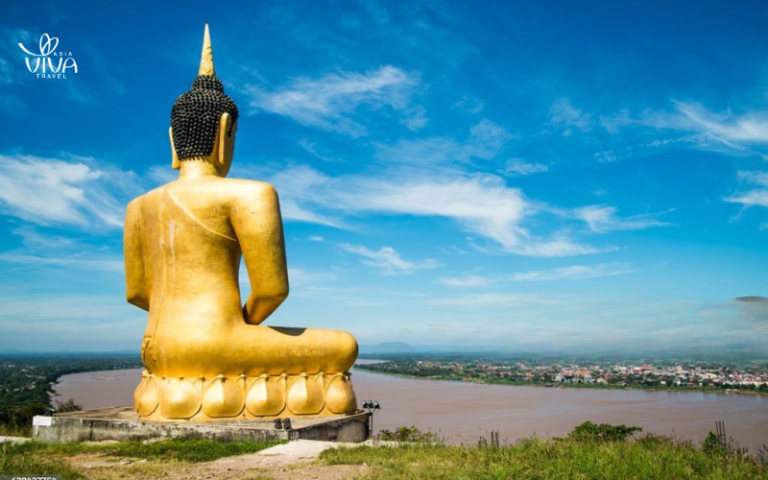
The Golden Buddha – overlooking the soul of Pakse
Phou Salao temple and the golden Buddha statue are located on a hilltop along the Mekong River, offering sweeping views of the surrounding landscape. Beyond religious culture and praying for good fortune, travelers are encouraged to witness the stunning sunset panorama of Pakse and the Mekong River from about 5 to 6 PM in golden light from above.
Lao cuisine is truly unique, with dishes that are rich in flavor and made from fresh, locally-sourced ingredients every day. Most dishes have a bold and balanced taste, often combining spicy, sour, salty, and slightly bitter notes. One standout dish that visitors should definitely try when in Pakse is Beef Laap and Tom Yum soup.
Laap is a traditional Laos dish made with various kinds of minced meat such as beef, chicken, pork, or even fish, mixed with fresh herbs, toasted rice powder, lime juice, and chili. Though it may sound simple, the Beef Laap in Pakse has a particularly delicious and refreshing taste that surprises many first-time tasters.
Tom Yum soup, though originally Thai, is also beloved in southern Laos. It’s a hot and sour soup made with shrimp or chicken, lemongrass, galangal, kaffir lime leaves, lime juice, and chili paste. The broth is both aromatic and invigorating, striking a perfect balance between spicy and tangy flavors – ideal for those looking for something comforting yet full of character.
In addition to Laap and Tom Yum, travelers can also experience:
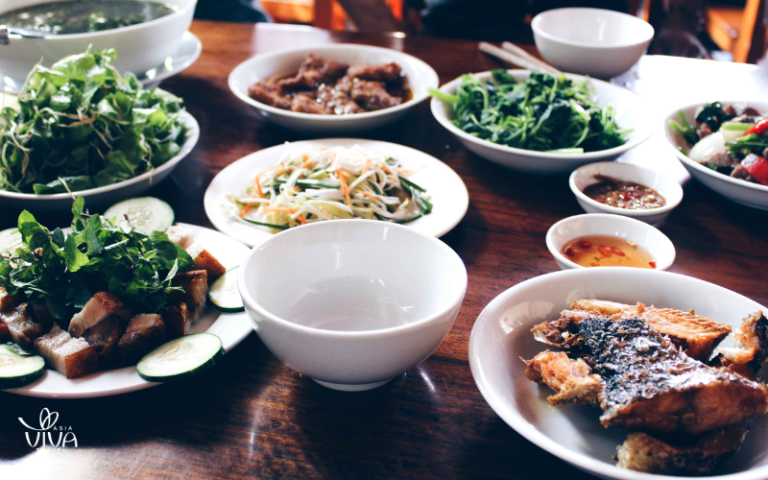
Taste of Pakse – bold, fresh, unforgettable
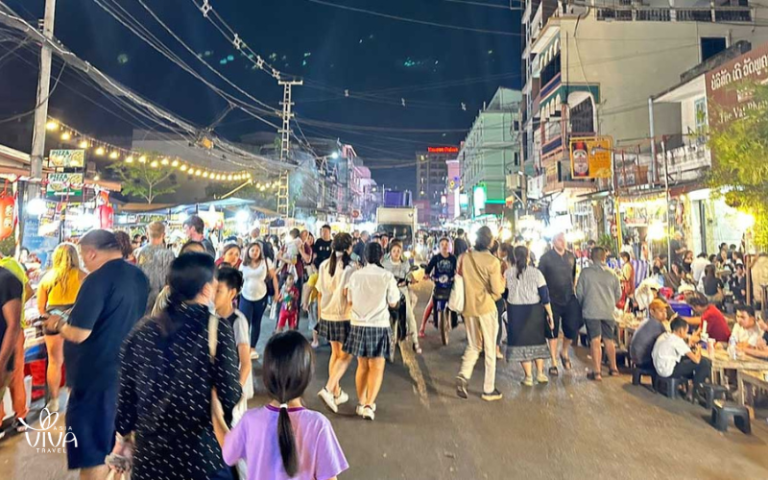
Pakse Night Market – where culture sparkles after dark
One of the most charming aspects that makes visitors fall in love with markets in Laos, is their bustling yet welcoming atmosphere. In Pakse, while the Dao Heuang Market is a well-known daytime market where locals sell fresh produce and travelers can enjoy authentic Laos street food while chatting with friendly vendors – –
As the sun sets and the temperature cools down, top things to do in Pakse at night must be visiting night markets and trying local unique food. The Pakse Night Market comes alive with twinkling lights and a vibrant energy, located near the riverside or central areas, the market is an ideal place for an evening stroll. Visitors can explore a variety of stalls selling everything from handmade crafts, clothes, and accessories to locally-produced goods and souvenirs — perfect for bringing home a memory of Laos.
The food section is just as lively, offering sizzling grills, fragrant noodle dishes, and sweet treats that fill the air with tempting aromas. The friendly vendors, the mix of locals and tourists, and the laid-back vibe make this night market not just a place to shop, but a cultural experience in itself – one that captures the spirit of Pakse after dark.
Festivals in Laos are celebrated with deep meaning and respect, often held to honor ancestors or to bring blessings for the future. In Pakse, the locals are always happy to welcome travelers to join these festive occasions. These events not only offer visitors a chance to experience unique local traditions and receive good luck, but also serve as a way to showcase Laos culture to the world and support local socio-economic development.
The first in the festival lineup is the Boat Racing Festival, held in October, marking the end of Buddhist Lent. The festival is both a sporting and spiritual event, where teams paddle long, narrow boats in thrilling races along the Mekong River. It’s a way to pay respect to the river spirits and celebrate unity among communities.
Another beloved celebration is Boun Pi Mai (Laos New Year), taking place in mid-April. This festival is all about joy, renewal, and purification. Locals and visitors splash water on each other as a symbol of washing away bad luck and welcoming a fresh start. People also visit temples, offer food to monks, pour water over Buddha statues, and build sand stupas – each act filled with cultural and spiritual meaning.
Getting Day trips from Pakse to enjoy festivals with tours in Laos at Asia Viva Travel!
Pakse may not be the most famous destination in Laos, but it’s full of surprises, from lush waterfalls and ancient temples to vibrant night markets and rich cultural experiences. Whether you’re wondering “Is Pakse worth visiting?” or searching for the best things to do in Pakse at night, this charming city has something for everyone.
Let Asia Viva Travel help you create the perfect Pakse tour—complete with day trips, local cuisine, and unforgettable moments. Ready to explore southern Laos? Contact us today!
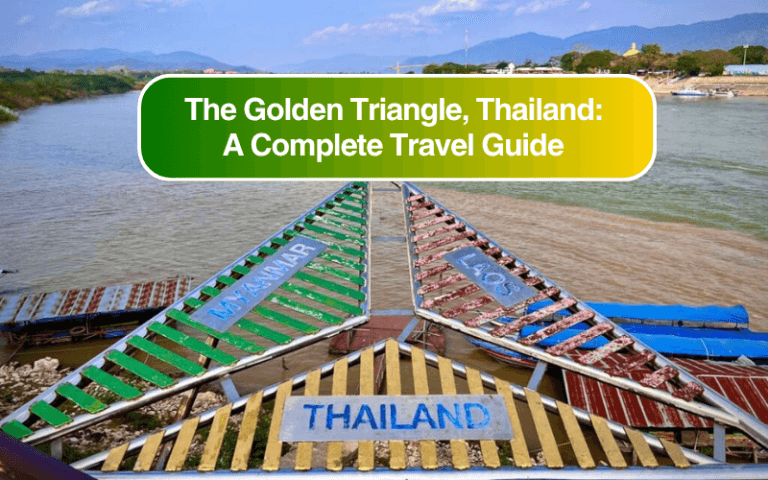
 19/11/2025
19/11/2025The Golden Triangle is one of the most legendary travel destinations in Southeast Asia, known for its history, stunning river landscapes, and multicultural influence

 08/10/2025
08/10/2025Discover Laos airports: 11 international & domestic hubs connecting travelers to Vientiane, Luang Prabang, Pakse, and nearby Southeast Asian countries.

 05/09/2025
05/09/2025Discover the Bolaven Plateau in southern Laos – explore stunning waterfalls, coffee plantations, local markets, and scenic loops with our complete travel guide
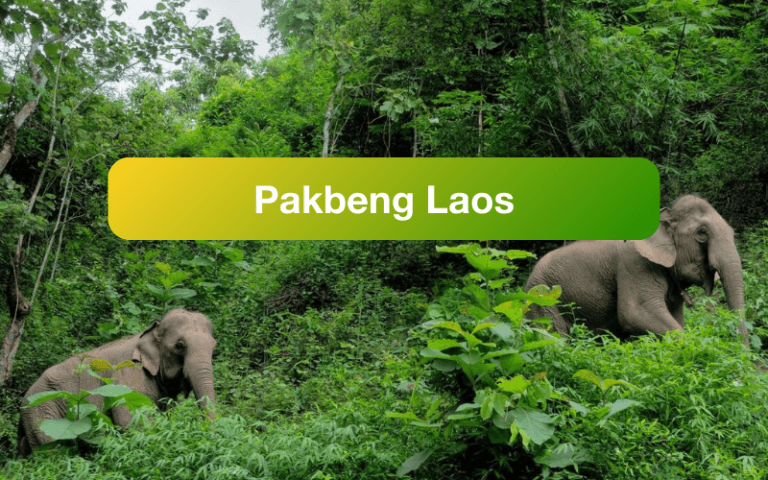
 23/08/2025
23/08/2025A true vagabond experience in the Pakbeng Laos river region, where the pace of life slows down on a slow boat trip, exploring peacefu villages and l landscapes